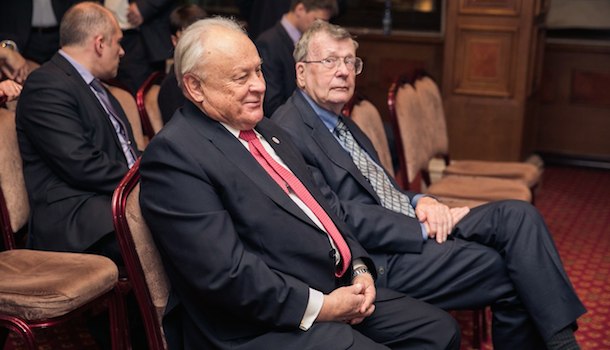A new era in global affairs began. At that moment, expectations were high, yet ambivalent, on both sides of the former Iron Curtain. The end of history discourse dominated economic debates and implied a bright post-Soviet trajectory for the newly established independent states. However, the Soviet legacy and obvious security threats signaled that the road to a post-Soviet regional order would be bumpy.
In fact, the multiple transitions turned out to be far more complex and non-linear than most analysts expected. Numerous fundamental questions remain unanswered up until now and new ones have emerged. The conflict in Ukraine and the deterioration of Russia-West relations to the level of what many call a new Cold War has again thrust the post-Soviet space in the international media spotlight and onto the immediate agenda of world leaders. Multiple questions about post-Soviet trajectories have once again gained a practical, rather than purely historical, meaning.
Marking the 25th anniversary of the disintegration of the USSR, Belarus will host a high-level international expert conference to examine today’s state of play in the post-Soviet space, its meaning for Europe and Eurasia and for the future of international relations and security.
Participants
High-profile experts from the post-Soviet space, EU, and the USA. Diplomats will be invited as observers.
Conference Objectives
- To analyse the state of the multiple internal and regional transitions in the post-Soviet space and its implications for international cooperation and security in Eurasia.
- To compare international perspectives on the place and role of the post-Soviet space in the new world order under de/construction.
- To reflect upon post-Soviet trajectories and opportunities to promote stability and security in the post-Soviet space.
Agenda
7 December
|
20.00-22.00 |
Night-owl session (off-the-record). Reality Check: A new Cold War? Crowne Plaza Hotel (13 Kirava str.) Alexander Iskandaryan Director, Caucasus Institute, Armenia Volodymyr Fesenko Chairman of Board, PENTA Center, Ukraine Christopher Hartwell President, CASE – Center for Social and Economic Research, USA – Poland Alexey Tokarev Senior Research Fellow, Institute for International Studies, MGIMO-University, Russia Moderator Yauheni Preiherman Head, Minsk Dialogue Track-II Initiative, Belarus |
8 December
|
9.30-10.00 |
Registration Executive Committee of the Commonwealth of Independent States (CIS) (17 Kirava str.) |
|
10.00-10.30 |
Opening ceremony, welcoming remarks Evgeny Shestakov Deputy Minister of Foreign Affairs, Belarus Sergey Rakhmanov Chairman, Standing Committee on International Affairs and National Security, Council of the Republic of the National Assembly, Belarus Valery Varanetsky Chairman, Standing Committee on International Affairs, House of Representatives of the National Assembly, Belarus Vladimir Kiku Director, Department of Humanitarian Cooperation, Political and Social Affairs, CIS Executive Committee Wolfgang Sender Country Director Belarus, Konrad Adenauer Foundation, Germany Yauheni Preiherman Head, Minsk Dialogue Track-II Initiative, Belarus |
|
10.30-12.00 |
Session 1. Multiple transitions: the post-Soviet countries on the political and economic maps 25 years after the collapse of the USSR. Christopher Hartwell President, CASE – Center for Social and Economic Research, USA – Poland Oksana Solopova Deputy Dean, Department of History, Moscow State University, Russia Laurence Broyd Senior Principal Research Analyst, Foreign and Commonwealth Office, UK Viachaslau Menkouski Professor, Department of History, Belarusian State University, Belarus Alexander Iskandaryan Director, Caucasus Institute, Armenia Moderator Viktar Shadursky Dean, Department of International Relations, Belarusian State University, Belarus |
|
12.00-12.30 |
Coffee break |
|
12.30-14.00 |
Session 2. In search of a divorce contract or a new model of integration? Failures and successes of post-Soviet dis/integration projects. Lessya Karatayeva Chief Researcher, Kazakhstan Institute for Strategic Studies under the President of the Republic of Kazakhstan, Kazakhstan Volodymyr Fesenko Chairman of Board, PENTA Center, Ukraine Andrei Rusakovich Associate Professor, Department of International Relations, Belarusian State University; Chairman of the Board, Foreign Policy and Security Research Centre, Belarus Alexey Tokarev Senior Research Fellow, Institute for International Studies, MGIMO-University, Russia Moderator Andrey Skryba Researcher, Centre for Comprehensive European and International Studies, Higher School of Economics, Russia |
|
14.00-15.00 |
Lunch |
|
15.00-16.15 |
Session 3. New dividing lines across the post-Soviet space: what has gone wrong in regional and global affairs? Key-note speeches Ivan Antonovich Former Minister of Foreign Affairs, Belarus Robert Barry Ambassador (Rtd), USA Commentators Paul Révay European Director, The Trilateral Commission, France Sergey Minasyan Deputy Director, Caucasus Institute, Armenia Moderator Yauheni Preiherman Head, Minsk Dialogue Track-II Initiative, Belarus |
|
16.15-16.30 |
Coffee break |
|
16.30-18.00 |
Session 4. The outlook for the post-Soviet space in the next decade: where are the trajectories heading and how to advance peace and development? Giorgi Kanashvili Executive Director, Caucasian House, Georgia Balázs Jarábik Nonresident Scholar, Russia and Eurasia Programme, Carnegie Endowment for International Peace, Slovakia Roza Turarbekova Associate Professor, Department of International Relations, Belarusian State University, Belarus Paul Hansbury Researcher, St. Antony’s College, Oxford University, UK Adil Kaukenov Director General, International Centre for Kazakhstani-Chinese Cooperation “China Centre”, Kazakhstan Vadim Gigin Dean, Department of Philosophy and Social Sciences, Belarusian State University, Belarus Moderator Wolfgang Sender Country Director Belarus, Konrad Adenauer Foundation, Germany |
|
18.00-18.10 |
Concluding remarks |


